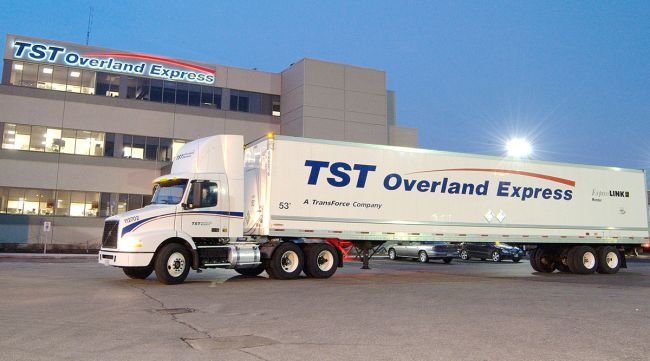TFI International operates TST Overland Express. TFI reported revenue of $1.79 billion in the most recent three-month period, compared with $2.42 billion in the prior-year period. (TFI International)
Profits at TFI International Inc. more than halved in the second quarter of 2023 to $128.2 million from $276.8 million in the year-ago period, the company said, citing reduced freight volumes.
Montreal-based TFI posted second-quarter diluted earnings per share of $1.47, compared with $3 in the year-ago period.
TFI ranks No. 4 on the Transport Topics Top 100 list of the largest for-hire carriers in North America.
The company reported revenue of $1.79 billion in the most recent three-month period, compared with $2.42 billion in the prior-year period. It said the decrease was mostly due to a decline in volumes driven by weaker end-market demand plus the sale of the CFI truckload, temperature control and Mexican non-asset logistics business.
Total revenue in the three months that ended June 30 declined across all segments relative to the year-earlier quarter, the company said.
Revenue at the company’s biggest unit, its less-than-truckload segment, saw a 27% decrease in the second quarter to $672.8 million from $870.2 million in the year-ago period.
TFI’s U.S. LTL operations posted second-quarter revenue of $467.9 million, compared with $585.5 million in the year-ago period, according to its quarterly report.
The reduction in U.S. LTL revenue was the result of a 16.2% decrease in tonnage to 822,000 tons in the most recent quarter from 981,000 tons in the second quarter of 2022 as well as a 4.6% decrease in revenue per hundredweight excluding fuel to $313.61 from $322.08 a year earlier.

How effective have third-party services proved to be for fleets? Let’s find out with Michael Precia of Fleetworthy Solutions and Dan Rutherford with Summit Virtual CFO by Anders. Tune in above or by going to RoadSigns.ttnews.com.
U.S. LTL tonnage declined at TFI as the result of a 17.9% decrease in the company’s shipment count to 1.492 million from 1.818 million a year earlier, although that was partially offset by a 2.1% increase in average weight per shipment to 1,102 pounds from 1,079 pounds in the year-ago period.
TFI said the U.S. LTL volume reduction was largely the result of end-market weakness combined with the deliberate elimination of unprofitable freight in the second half of 2022.
The company’s U.S. less-than-truckload fuel surcharge revenue in the second quarter of 2023 totaled $99.3 million, compared with $179.7 million in the year-ago period. In the United States, the company’s LTL operating ratio was 91.5 in the most recent three months, compared with 88 a year earlier.
Operating ratio provides insight on how a company is doing in balancing its costs and revenue generation. The lower the ratio, the better a company’s performance. For comparison, TFI’s Canadian LTL business posted an operating ratio of 73.7 in the most recent quarter.
TFI ranks No. 6 on the TT LTL carriers list in North America. Saia Inc., which ranks No. 9 on the LTL list and No. 21 on the Top 100, reported an operating ratio of 82.7 in the second quarter of 2023.
TFI’s second-largest unit, its truckload operations, saw revenue decline even more steeply, falling 32% year-over-year to $410.7 million from $556.9 million, although this was also impacted by the asset divestment.
The company’s U.S. and Canadian truckload business reported an operating ratio of 83.9 in the most recent quarter, compared with 78.2 in the year-ago period.
Revenue at TFI’s package and courier unit fell 15% year-over-year to $115.6 million from $125.1 million a year earlier.
“Despite a difficult freight market and reduced volumes industrywide, our results reflect the quality of our operations and our team’s skill in responding to rapidly changing market conditions. We produced solid operating ratios across all our business segments while again generating more than $200 million in net cash from operating activities,” CEO Alain Bédard said.
Looking forward, the company said North American economic uncertainty is likely to continue weighing on freight demand dynamics. Lower diesel prices in the months ahead could also cause a continued earnings headwind, it said.






